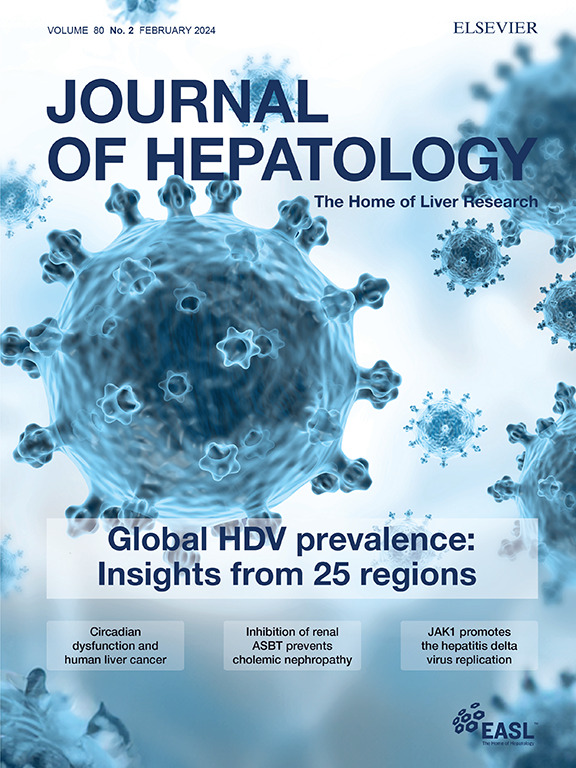Outcomes in the Asian subgroup of the phase III randomised HIMALAYA study of tremelimumab plus durvalumab in unresectable hepatocellular carcinoma
IF 26.8
1区 医学
Q1 GASTROENTEROLOGY & HEPATOLOGY
引用次数: 0
Abstract
Background & Aims
In the global, phase III HIMALAYA study in unresectable hepatocellular carcinoma (uHCC), STRIDE (Single Tremelimumab Regular Interval Durvalumab) improved overall survival (OS) vs. sorafenib; durvalumab was non-inferior to sorafenib. HBV is the predominant HCC aetiology in most of Asia vs. HCV or non-viral aetiologies in Western countries and Japan. This analysis evaluated safety and efficacy outcomes for STRIDE and durvalumab monotherapy vs. sorafenib, in HIMALAYA participants enrolled in Asia, excluding Japan.
Methods
In HIMALAYA, participants were randomised to STRIDE, durvalumab, or sorafenib. The Asian subgroup in this analysis included participants enrolled in Hong Kong, India, South Korea, Taiwan, Thailand, and Vietnam. OS, objective response rate (ORR; per RECIST, version 1.1), and safety were assessed in the Asian subgroup and in an exploratory subgroup of participants in Hong Kong and Taiwan.
Results
The Asian subgroup included 479 participants randomised to STRIDE (n = 156), durvalumab (n = 167), or sorafenib (n = 156). OS was improved for STRIDE vs. sorafenib (hazard ratio [HR] 0.68; 95% CI 0.52-0.89). The OS HR for durvalumab vs. sorafenib was 0.83 (95% CI 0.64-1.06). In Hong Kong and Taiwan (n = 141), OS HRs for STRIDE vs. sorafenib and durvalumab vs. sorafenib were 0.44 (95% CI 0.26-0.77) and 0.64 (95% CI 0.37-1.08), respectively. In the Asian subgroup, ORR (including unconfirmed responses) was numerically higher for STRIDE (28.2%) and durvalumab (18.6%) vs. sorafenib (9.0%), and Grade 3/4 treatment-related adverse events were numerically lower for STRIDE (19.9%) and durvalumab (13.3%) vs. sorafenib (30.5%).
Conclusions
STRIDE improved outcomes vs. sorafenib in the Asian subgroup. These results support the benefits of STRIDE for participants with uHCC globally, including in the Asia-Pacific region.
Clinical trial number
NCT03298451.
Impact and implications
The global, phase III HIMALAYA study found that the STRIDE (Single Tremelimumab Regular Interval Durvalumab) regimen improved overall survival (OS), including long-term OS vs. sorafenib, and that durvalumab monotherapy was non-inferior to sorafenib in participants with unresectable hepatocellular carcinoma (uHCC). However, there are differences in the aetiology and clinical practices related to HCC in parts of Asia, compared to Western countries and Japan, which could lead to differences in treatment outcomes between these regions. The results of this analysis demonstrate the benefits of STRIDE for participants in the Asia-Pacific region, consistent with the full, global study population. Overall, these findings continue to support the use of STRIDE in a diverse population, reflective of uHCC globally.

特瑞木单抗加杜伐单抗治疗不可切除肝细胞癌的 HIMALAYA III 期随机研究的亚洲亚组结果。
背景与目的:在针对不可切除肝细胞癌(uHCC)的全球III期HIMALAYA研究中,STRIDE(单次特雷莫单抗常规间隔期杜伐单抗)与索拉非尼相比提高了总生存率(OS);杜伐单抗的疗效不优于索拉非尼。在亚洲大部分地区,HBV 是主要的 HCC 病因,而在西方国家和日本,HCV 或非病毒性病因则是主要的 HCC 病因。本分析评估了亚洲(不包括日本)HIMALAYA 参试者接受 STRIDE 和 durvalumab 单药治疗与索拉非尼治疗的安全性和疗效结果:在HIMALAYA中,参试者被随机分配到STRIDE、durvalumab或索拉非尼。本分析中的亚洲亚组包括香港、印度、韩国、台湾、泰国和越南的参试者。对亚洲亚组以及香港和台湾参与者探索性亚组的OS、客观反应率(ORR;根据实体瘤反应评价标准1.1版)和安全性进行了评估:亚洲亚组包括479名随机接受STRIDE(156人)、durvalumab(167人)或索拉非尼(156人)治疗的患者。与索拉非尼相比,STRIDE的OS有所改善(HR为0.68;95% CI为0.52-0.89])。与索拉非尼相比,durvalumab的OS HR为0.83(95% CI 0.64-1.06)。在香港和台湾(n=141),STRIDE对比索拉非尼和durvalumab对比索拉非尼的OS HR分别为0.44(95% CI 0.26-0.77)和0.64(95% CI 0.37-1.08)。在亚洲亚组中,STRIDE(28.2%)和durvalumab(18.6%)的ORR(包括未证实的应答)高于索拉非尼(9.0%),STRIDE(19.9%)和durvalumab(13.3%)的3/4级治疗相关不良事件低于索拉非尼(30.5%):结论:与索拉非尼相比,STRIDE改善了亚洲亚组的治疗效果。这些结果支持STRIDE对包括亚太地区在内的全球uHCC参与者的益处:临床试验编号:NCT03298451 影响和意义:全球III期HIMALAYA研究发现,在不可切除肝细胞癌(uHCC)患者中,与索拉非尼相比,STRIDE(单药曲马单抗常规间隔杜伐单抗)方案可改善总生存期(OS),包括长期OS,而且杜伐单抗单药治疗效果不劣于索拉非尼。然而,与西方国家和日本相比,亚洲部分地区的肝细胞癌病因和临床实践存在差异,这可能导致这些地区的治疗结果不同。这项分析结果表明,STRIDE 为亚太地区的参与者带来了益处,这与整个全球研究人群的情况一致。总体而言,这些研究结果继续支持 STRIDE 在不同人群中的应用,反映了全球 uHCC 的情况。
本文章由计算机程序翻译,如有差异,请以英文原文为准。
求助全文
约1分钟内获得全文
求助全文
来源期刊

Journal of Hepatology
医学-胃肠肝病学
CiteScore
46.10
自引率
4.30%
发文量
2325
审稿时长
30 days
期刊介绍:
The Journal of Hepatology is the official publication of the European Association for the Study of the Liver (EASL). It is dedicated to presenting clinical and basic research in the field of hepatology through original papers, reviews, case reports, and letters to the Editor. The Journal is published in English and may consider supplements that pass an editorial review.
 求助内容:
求助内容: 应助结果提醒方式:
应助结果提醒方式:


